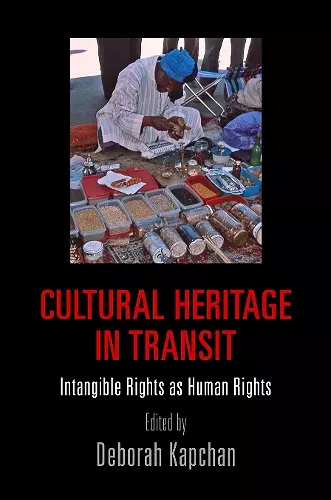Cultural Heritage in Transit
Intangible Rights As Human Rights
Format:Hardback
Publisher:University of Pennsylvania Press
Published:21st May '14
Currently unavailable, and unfortunately no date known when it will be back

Are human rights universal? The immediate response is "yes, of course." However, that simple affirmation assumes agreement about definitions of the "human" as well as what a human is entitled to under law, bringing us quickly to concepts such as freedom, property, and the inalienability of both. The assumption that we all mean the same things by these terms carries much political import, especially given that different communities (national, ethnic, religious, gendered) enact some of the most basic categories of human experience (self, home, freedom, sovereignty) differently. But whereas legal definitions often seek to eliminate ambiguity in order to define and protect the rights of humanity, ambiguity is in fact inherently human, especially in performances of heritage where the rights to sense, to imagine, and to claim cultural identities that resist circumscription are at play.
Cultural Heritage in Transit examines the intangibilities of human rights in the realm of heritage production, focusing not only on the ephemeral culture of those who perform it but also on the ambiguities present in the idea of cultural property in general-who claims it? who may use it? who should not but does? In this volume, folklorists, ethnologists, and anthropologists analyze the practice and performance of culture in particular contexts-including Roma wedding music, Trinidadian wining, Moroccan verbal art, and Neopagan rituals-in order to draw apart the social, political, and aesthetic materialities of heritage production, including inequities and hierarchies that did not exist before. The authors collectively craft theoretical frameworks to make sense of the ways the rights of nations interact with the rights of individuals and communities when the public value of artistic creations is constituted through international law.
Contributors: Valdimar Tr. Hafstein, Deborah Kapchan, Barbro Klein, Sabina Magliocco, Dorothy Noyes, Philip W. Scher, Carol Silverman.
"This valuable, innovative, and coherent volume will add a complex and complementary dimension to discussions of human rights." (Donald Brenneis, University of California, Santa Cruz)
ISBN: 9780812245943
Dimensions: unknown
Weight: unknown
248 pages